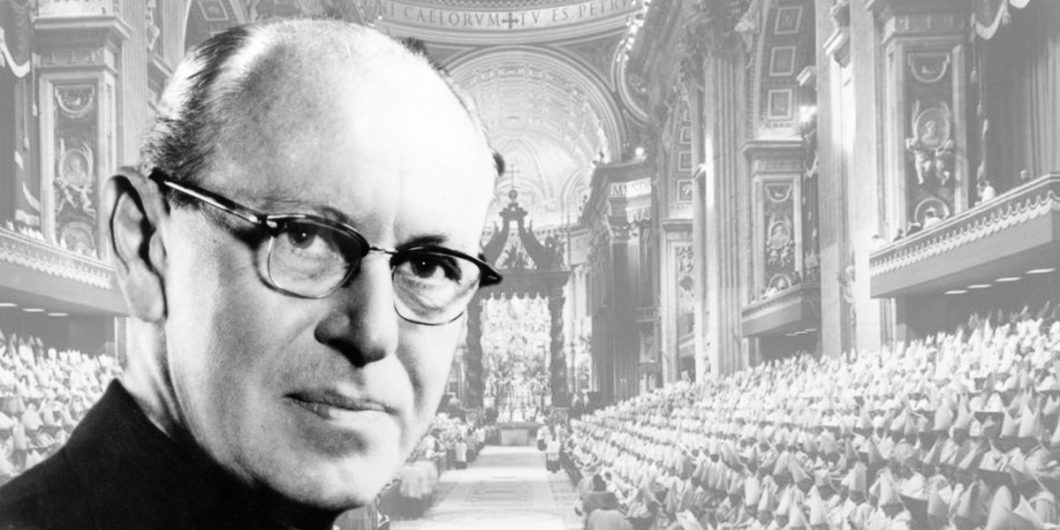This is a war going on until only one man stands, the viewer is reminded at the end.
Recovering a Lost Tradition
James Patterson’s essay very capably explains why Fr. John Courtney Murray is an important political thinker whose work remains extremely relevant to our own time. In particular, Patterson does an admirable job of explaining why it is quite wrong for traditionalists to lump Murray together with post-WW II idealists who viewed the neo-liberal order through heavily rose-tinted glasses. For some 20th century political thinkers, it really did seem reasonable to expect political liberalism to solve most of society’s ills, from poverty to racism to war. Because he is widely associated with President John F. Kennedy, and with the Second Vatican Council’s controversial Dignitatis Humanae treatise, Murray is often classed with this group of thinkers. This, as Patterson rightly explains, is a misunderstanding. Murray condemned political liberalism. What distinguishes him as a thinker is not his enthusiasm for modernity, but rather his determination to find a way for Catholics to remain faithful citizens of modern states without rejecting any part of the Church’s tradition.
For all its merits, Patterson’s essay may be more informative than reassuring. He clearly explains why he still “holds these truths.” But he doesn’t even pretend that we, the American people, do the same. In fact, he declares late in the essay that “the old consensus that Murray examined in We Hold These Truths is dead.” That seems like a very serious problem for a would-be proponent of Murray’s views.
Practicality is, after all, supposed to be a major selling point of Murray’s position. He wants American Catholics to support their Constitutional order, notbecause of its intrinsic superiority to the confessional state, but rather because it is acceptable, and capable of securing civic peace and protecting the freedom of the Church. What if that ceases to be the case? If Americans as a group have largely rejected the natural law consensus that Murray attributes to the Founders and to his own contemporaries, then it’s no longer clear whether Catholics can or should support the state. A government built on liberal political principles (such as those spelled out in John Rawls Theory of Justice), will perpetually threaten the freedom of the Church, and the consciences of the faithful. Rigidly secular states are predictably hostile to their non-secular competitors. If this is the reality we face, perhaps it is just as well to take our stand with Pius IX. Renounce liberalism and all its pomps, and lobby for the political situation that we really want, up to and including a new confessional state.
Patterson clearly doesn’t see this as a real solution, and I have to agree. Reviving crown-and-altar politics seems impractical enough in Poland or France. Here in the United States, that dream is wildly fanciful, either foolishly escapist or an unpersuasive cover for ordinary power-lust. To me though, Patterson’s argument against the integralists looks suspiciously like a straw man. Are there really many American traditionalists who actively favor the Hapsburg Option? In my experience, people who self-identify as “integralists” or “monarchists” usually understand that these can only serve, in our present situation, as theoretical positions that help us to gain perspective on more practicable options. The caustic style of the neo-integralists does invite stringent pushback, especially because they too tend to throw themselves into the battle of warring straw men, abusively dismissing most of their conservative critics as “zombie Reaganites” or Establishment drones, without serious consideration of their arguments. Right-wing intellectuals find it difficult to pull away from these internecine battles, though it should be obvious at this point that they have not helped us identify a path to genuine cultural renewal.
In an effort to channel Murray’s constructive spirit, I would suggest that a path for traditionalists can only emerge after we have grappled seriously with three crucial questions. First, how dire are our present circumstances? Second, what realistic possibilities might lie ahead for our nation? Third, which of these is it most prudent for us to try to realize? All three of these questions pose great difficulties, so I will not pretend to offer satisfying answers. I will simply make a few suggestions as to how one might go about answering them, if one believed (as I do, and as Patterson clearly also does) that Murray’s perspective on the American experiment remains insightful and wise.
When the political arena becomes intensely polarized, it can be difficult to get perspective on the real gravity of our situation. Both of our political parties are struggling mightily to maintain cohesion within their coalitions, which gives politicians and commentators strong motivation to wax hyperbolic. As our national funk deepens, we all individually start keeping a tally of personal grievances, increasing general fear and resentment. Even or especially in times of political stress, it can be healthy to right-size our perspective by considering the circumstances of Christians living in the Islamic world, or under secular dictators like Xi Jinping or Kim Jong Un. If indeed our Constitutional order has failed, we surely remain among the most blessed of failures. The very fact that we continue to debate these questions so publicly stands as a testament to that truth.
Hyperbole and fatalism masquerade as the thesis, but they’re really more of a makeshift bridge, meant to transport traditionalists from fruitless rage to some sort of strategy session. Unfortunately, many people fall through the cracks and end up drowning in despair.
Nevertheless, religious traditionalists do feel threatened, and it would be unfair to attribute this entirely to political tribalism or paranoia. Woke activism is becoming genuinely alarming. The progressive orthodoxy seems to keep evolving at dizzying speed. Woke activists impose sanctions, both social and professional, against those who fail to keep pace. Under such conditions, people start feeling that they are trapped in an Orwellian dystopia. It’s hard notto engage in grim prognostication about where these paths might lead. Near the end of his essay, Patterson suggests that this radicalism may dissipate once Donald Trump leaves office. I agree that Trump has been a significant catalyst, but it seems over-optimistic to expect such a neat end to progressive pathologies. The “woke warriors” had their ideological ancestors. They will have descendants, too.
Patterson is absolutely correct, however, that radical progressivism lacks both stability and internal coherence. It seems, in large measure, to be a desperate saving throw on the part of a faltering elite that needs new ways to bolster its legitimacy. It is difficult to see how it can succeed. The social justice activists have psychological needs that cannot be met by any practical agenda. They have no widespread popular mandate, and no satisfying answers to the questions that trouble our society. History suggests that this sort of energized, ideological leftism tends to end in a circular firing squad. If someone else could step up and offer better leadership, it seems very possible that person or party could supplant or colonize our present elite.
This leads into the second and third questions. What real possibilities exist for our nation? Once again, the ongoing conversation on the political right has left many of us quite frustrated. Flamboyant polemicists like Adrian Vermeule regularly make suggestions that are simply preposterous on face. Is he serious, or is he trolling us? (Do the participants in many of these conversations even know the difference anymore?) Other high-profile right-wing commentators, like Rod Dreher or Patrick Deneen, have an infuriating habit of leading with their chins, selling books with incompatibilist-sounding theses, but filling the later chapters of those books with milder commentary and practical suggestions. One searches in vain for a clear prognosis. Is Western Civilization over, or is it not? It is possible that these authors cultivate their ambiguities deliberately as a marketing strategy, but I suspect the reality is less damning. They can see that something is broken, but they haven’t quite figured out what it is. Hyperbole and fatalism masquerade as the thesis, but they’re really more of a makeshift bridge, meant to transport traditionalists from fruitless rage to some sort of strategy session. Unfortunately, many people fall through the cracks and end up drowning in despair.
It would be deeply unfair to blame a small handful of men for failing to answer such difficult questions. We do need to keep trying, however. Without a realistic sense of the possibilities, it is impossible to chart a prudent course. At this juncture we sorely need the humility and discernment that Murray showed in We Hold These Truths. Though he steadfastly refused to compromise core principles of faith or morals, he was honest about the real failures of historical Catholic societies. He was not a fatalist, but he continually reminded readers of human corruption and frailty, which inevitably plague the kingdoms of men. Contemporary traditionalists need to try harder to emulate these Murray-esque qualities. If we truly desire political change or cultural renewal, we must be brutally honest about the reasons why we haven’t already won the battles that matter most to us. Some of the reasons reflect the failings of liberals, our compatriots, our elected officials, our bishops, or perhaps the liberal order itself. Some reflect the failings of Catholic intellectuals, imprudent culture warriors, or rank-and-file religious traditionalists. Those are generally the pieces of the puzzle that we are most reluctant to examine.
Do we, as a people, still hold these truths? Perhaps not, but the foundations of that tradition still exist. Now would be a good time to uncover them.


